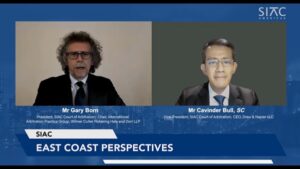In Disney’s Fantasia, the third segment—called The Sorcerer’s Apprentice—is based on the poem by Johann Wolfgang von Goethe. It features the charming but somewhat lazy Mickey, who is tired of his chores. To get some help, he borrows Sorcerer Yen Sid’s hat, and uses it to magically animate a broom with what today we might call artificial intelligence.

At first it looks like a great solution! The broom readily takes up Mickey’s chores, including carrying buckets of water to fill a cauldron.
The problem is that, like more modern versions of artificial intelligence, the broom has no common sense. As a result, the broom continues to bring buckets of water long after the cauldron is full, and on and on and on until the entire room is flooded.
Mickey makes various attempts to stop the broom, alas with no success. Eventually, he tries to chop the broom into pieces with a huge axe. His initial relief soon vanishes when he sees that the little wooden pieces that had been lying quietly on the floor suddenly come alive, stand upright, grow into brooms, and start carrying even more buckets of water.
This tale depicts the concerns expressed by Dr Schäfer in his recent blog post—ill-used artificial intelligence (AI) transmutating from a helpful tool into a flood of unforeseen consequences.
It is an easy task to write a response to Dr Schäfer because on virtually all points, we are in agreement. Of course, there is a need for transparency, and we would go so far as to say modesty and restraint in using AI in the context of dispute resolution. We also agree that there are important ethical questions to be addressed in order to ensure that any technology or process applied in dispute resolution is fair and unbiased.
We also agree with observations made not only by Dr Schäfer, but in other posts in this blog here and here that have pointed out the limitations that exist for introducing effective AI in light of the confidentiality and increased variability in international arbitration cases. In fact, a prior blog post by Aditya Singh Chauhan, which was selected as a winner in our Essay Competition, stated quite simply (and perhaps rather fittingly) that “AI is not magic, just glorified statistics.”
It is easy for us to agree on all these points because, despite the similarity in names, Arbitrator Intelligence does not use AI or Artificial Intelligence. We also do not currently engage in predictive analytics. Instead, our Reports focus on descriptive analytics.
Those descriptive analytics, however, still provide incredible empowerment for parties and counsel seeking information about selected arbitrators. In the past, parties and counsel were not able to obtain broad-based insights about an arbitrator’s track record, but only a few limited examples based on ad hoc research to uncover details from still-confidential previous arbitrations.
Arbitrator Intelligence has replaced that hunt-and-peck method by enabling, through our platform, hundreds and thousands of lawyers from around the world to exchange information on an anonymous and confidential basis. The results may seem magical when you see the insights we provide in our Report on Fernando Cantuarias, based on feedback from 25 individual attorneys and on 19 cases in which the awards remain confidential. You can browse the full Report yourself by clicking here to obtain access through our website.
Before you look, query whether you would, through ad hoc research, be able to guess accurately whether more Claimants or more Respondents self-reported having prevailed in cases in which Cantuarias sat? Or would you be able to guess which standard Cantuarias tribunals most frequently used to award document production or interest? For most, other than the sorcerers among us, the answer will likely be no.
Even in investor-State arbitration, where most awards are public, reading past awards one-by-one can make it difficult to discern patterns and compare those patterns for a specific arbitrator to those from other arbitrators.
Instead, you can see our full Report on Juan Armesto—gain access by clicking here.
If you just read his publicly available awards, would you be able to accurately guess the rate of recovery for Claimants in Armesto cases, in comparison with other arbitrators or by reference to the average of all investment cases? Would you be able to estimate how costs and fees are typically allocated by tribunals on which he sat? Or how the duration of Armesto investment arbitrations compares with averages, or differs based on whether Armesto was the chair or a co-arbitrator, whether there was a dissent, or whether the case was bifurcated or trifurcated?
These kinds of insights are readily available regarding judges in national courts, and are proving invaluable to parties in domestic litigation. As explained in a recent article by Burford’s Jeffery Commission and Giulia Previti:
[L]itigation analytics providers offer sophisticated data analysis tools that, if used properly, can shed light on how a particular judge is likely to rule, as well as provide indications on the expected length or cost of specific proceedings. This information aids counsel and parties in making important strategic decisions, including whether to pursue a particular case or litigation strategy.
Commission and Previti also note that “access to data analytics is even more relevant in the context of international arbitration, where the parties and counsel exert a greater degree of control over key features of the dispute resolution process.”
Going back to Dr Schäfer, Goethe, and Disney’s concerns, we believe these basic insights improve transparency and predictability of international arbitration for parties. Our commitment to transparency and integrity is part of our DNA, manifesting in how we created our platform, how we collect information and how we present information in our Reports.
Our Arbitrator Intelligence Questionnaire or “AIQ” was developed after extensive public vetting, including sessions with over 500 lawyers, arbitrators, staff and administrators from arbitral institutions. Such broad consultation enabled us to reduce or eliminate cultural biases in our questionnaire and instead truly reflect the diversity of our field—no cultural approach is preferred. Our Reports reflect the feedback provided on the basis of such cultural neutrality.
We are transparent even in our provision of descriptive analytics—our Reports are accompanied by detailed guidance in the form of a “How to read” instructional note, a “note on methodology” and a detailed “glossary”. Our Reports are tools to assist parties and their counsel in selecting arbitrators and developing case strategies—an augmentation of, not a replacement for, human decision making.
Arbitrator Intelligence provides benchmarks against which parties and counsel can check their assumptions when evaluating arbitrators, including some assumptions they did not even know they made. Moreover, our Reports organize information in a user-friendly format that enables users to understand and assess our data and analytics in the context of their own search process. Imagine starting your next arbitrator search or discussion about possible chairpersons with one of our Reports in hand.
As we prepare Reports, we notify the arbitrators that we have received feedback about them, which includes personal data obtained from sources in the public domain, such as publicly available awards, in accordance with our Arbitrator Personal Data Policy. Information relating to the counsel, parties, and third-party funders who complete our AIQ is anonymized and kept confidential to maintain the independence of the feedback.
The size of our Reports depends solely on the amount of external feedback provided in the AIQ, or the number of publicly available awards rendered by a particular arbitrator. There is no opportunity for outside influence on the positioning of an arbitrator on the AI website, and there is no algorithm dictating which Reports appear first on the page. Instead, the reports are presented in alphabetical order, regardless of size.
Note to arbitrators: If you don’t yet have a Report, encourage parties and counsel in your next arbitration to fill out an AIQ!
To ensure quality, we collaborate with law firms and arbitral institutions, the first such cooperating institution being the Singapore International Arbitration Centre. Since that time, we have welcomed the opportunity to cooperate with institutions, law firms, corporations and states committed to sharing and encouraging the submission of feedback about arbitrators.

Ultimately, the theme of the Sorcerer’s Apprentice and Dr Schäfer’s blog is the same: unwise use of the power of magic or technology can turn against those who invoke it and potentially cause much damage in the process.
At Arbitrator Intelligence, we could not agree more.
Our road so far has been long, and in many ways arduous as we have faced criticism and concerns, some fair and occasionally some not so fair.
But our road has also been incredibly exciting, inspirational, and gratifying. Although we have always believed in the transformative power of our Reports, even we have been pleasantly surprised by the flood of positive feedback and encouragement we have received from arbitrators, counsel, institutions, academics, and of course parties, both corporations and States.
Each day with renewed resolve, we aim to respect the interests and concerns of all stakeholders who make international arbitration function. We know that is the only way to establish the trust that is essential for an online platform like ours to build the essential networks that are necessary for it to function properly.
Ultimately, despite the pressures that come with any start up, we remain professionally committed internally to the values we aim to promote externally: transparency, accountability, and diversity.
We hope you will join us in creating transformational magic, together.
________________________
To make sure you do not miss out on regular updates from the Kluwer Arbitration Blog, please subscribe here. To submit a proposal for a blog post, please consult our Editorial Guidelines.
Profile Navigator and Relationship Indicator
Access 17,000+ data-driven profiles of arbitrators, expert witnesses, and counsels, derived from Kluwer Arbitration's comprehensive collection of international cases and awards and appointment data of leading arbitral institutions, to uncover potential conflicts of interest.
Learn how Kluwer Arbitration can support you.



Professor Rogers, Merry Christmas and good luck with your academic career and AI enterprise in 2021. I just wanted to comment on your analogy, the Sorcerer’s Apprentice, which has been bugging me for a few weeks. How can a poem written in 1797 and made into a film in 1940 focus attention on the issues raised in Dr Schäfer’s blog? For one thing, the Sorcerer’s Apprentice is tech innovator-centric (focusing on the anxieties of the apprentice), whereas Dr. Schäfer’s blog raises issues about how AI will impact arbitrators and the public. It struck me that the launch of Elon Musk’s Starlink satellite network in April provides a fitting analogy: In April, European observers watched the night sky in surprise as a convoy of 30 star-like objects traveled in convoy across the night sky. SpaceX had decided to launch this network because it would, among other things, reduce internet latency by 3 microseconds, providing its users (such as international trading banks) with an advantage over non-users in terms of the speed at which they can execute trades. There are currently a thousand-odd Starlink satellites in orbit, with forty-two thousand planned. Some people think this will ruin the night sky for astronomy. Elon Musk may be right that the problem has been solved by painting the satellites with non-reflective paint. Maybe observers of the sky are right that what an American entrepreneur wants to do with the sky, explaining that it will improve the internet, lacks legitimacy to a certain extent. This comes back to the basis on which you analyse and publish data about arbitrators – not on the basis of consent, but on the basis of your interest in selling a report, and because you argue that it’s in the interest of the international arbitration community. Perhaps that position lacks legitimacy to a certain extent. I don’t mean any of this to discourage you. On the contrary, good luck to you. I just wanted to suggest this metaphor.